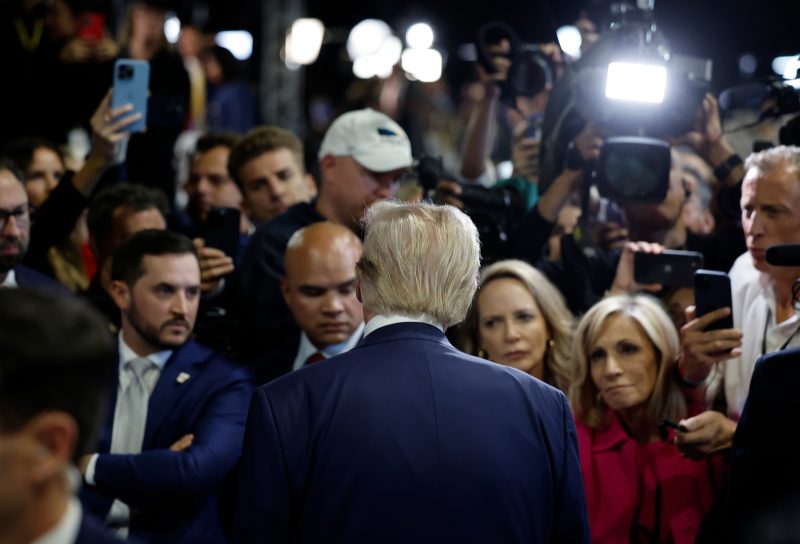
Donald Trump and his campaign have quickly responded to Sunday’s threat to the former president’s life by blaming Democrats. High on their list of alleged offenses? Democrats’ having called Trump a “threat to democracy” and a “fascist.”
Trump spotlighted the “threat to democracy” rhetoric in a Fox News interview Monday in which he directly blamed President Joe Biden and Vice President Kamala Harris. His running mate, JD Vance, referenced the “fascist” rhetoric at an event later in the day in Georgia.
Given what is being investigated as a second attempt to assassinate Trump, a debate over whether political rhetoric goes too far is valid. Plenty would argue — and are arguing — that it’s fair to affix the “threat to democracy” label to a guy who, after all, tried to overturn the 2020 election based on lies. And whether “fascist” is appropriate or not, Trump has certainly adopted some authoritarian-leaning proposals. He even talked about needing to be a dictator on Day One of his presidency and floated the idea of “terminating” parts of the Constitution.
There remains no evidence that the gunmen in the two incidents were actually incited by Democrats’ rhetoric.
But even if we set all that aside, Trump’s argument is flawed by a significant deficit: He uses these talking points a lot more than his opponents right now — and has been for months.
Democrats largely turned the page on the “threat to democracy” talking point ever since the first Trump assassination attempt and Harris’s replacement of Biden in July. The Biden and Harris political efforts have rarely called Trump a “fascist.” They’ve made other arguments in that vein, but not as directly.
Nor have they been as direct as Trump has, repeatedly.
According to a Washington Post review of campaign appearances and social media posts, Trump has called Harris, the Democrats or other perceived foes a “threat to democracy” a dozen times in the past month and more than 20 times since Harris got into the race.
“She shouldn’t be there anyway. She got no votes,” Trump said Friday in Las Vegas. “She’s a threat to democracy, right?”
“They’re the threat to democracy with the fake ‘Russia, Russia, Russia’ investigation that went nowhere,” Trump said at last week’s debate.
“THE FAILING NEW YORK TIMES IS A TRUE THREAT TO DEMOCRACY!” Trump posted on social media just hours before Ryan Wesley Routh was apprehended Sunday after he allegedly hid himself in the bushes with a rifle and scope close to where Trump was golfing in West Palm Beach, Fla.
Trump has also used the “fascist” label at least seven times in the past month, and he used it dozens more times before that.
He invoked fascism twice Friday alone, including by calling Harris a “radical-left Marxist communist fascist.”
Harris and her campaign haven’t used such rhetoric nearly as much in recent months. The Trump campaign has pointed to specific examples of supposedly dangerous Democratic rhetoric, but much of it is months old at this point.
The campaign on Monday posted four X posts from Harris herself, but the dates were conspicuously cropped out; it turns out none of the posts came after July 4.
Kamala Harris has consistently called President Trump a “dictator” and “a threat to democracy.”
Make no mistake: it’s Kamala and the Democrats who are the party of violence. pic.twitter.com/N7bhK2g7nf
— Trump War Room (@TrumpWarRoom) September 16, 2024
About the most applicable semi-recent example cited by the Trump campaign was from Harris’s now-running mate, Tim Walz, in late July, when he agreed that Trump and Vance were a “threat to democracy” and would “put people’s lives in danger.” Walz added: “The fascists depend on fear. The fascists depend on us going back.”
These comments came after the first assassination attempt on Trump but before the Minnesota governor was picked to join the Democratic ticket.
Trump allies have also pointed to Biden’s invoking the f-word by describing “semi-fascism” within the MAGA movement — a comment for which Republicans roundly criticized him. That comment came in 2022.
The Post’s review found other Biden and Harris allies invoking the “threat to democracy” language in recent weeks, but not extensively and generally not from the campaign. They include Republican and conservative Harris endorsers such as former congresswomen Liz Cheney (R-Wyo.) and Barbara Comstock (R-Va.), and former federal judge J. Michael Luttig. Former Democratic presidential nominee Hillary Clinton on Monday night cited Trump’s “danger to our country and the world.” And former House speaker Nancy Pelosi (D-Calif.), in an interview at the Democratic National Convention last month, called Trump “a threat to our democracy of the kind that we have not seen.”
But even at the convention, that kind of commentary wasn’t a fixture. Although Biden has favored this talking point, his speech on the convention’s first night more obliquely cited threats to democracy, such as Jan. 6, 2021, before citing how “Donald Trump says he will refuse to accept the election result if he loses again.” Harris in her own speech merely cited “the enduring struggle between democracy and tyranny.”
That’s indicative of how this has faded as a talking point for Democrats — whether because they soured on it after the first Trump assassination attempt, when some Republicans cried foul, or because they didn’t see it paying political dividends, or some combination of both. But, at the same time, Trump has gone full speed ahead on this rhetoric.
Republicans would undoubtedly argue that the old comments are still applicable when it comes to potentially inciting violence (even as there remains no evidence that they did in these cases). And Trump often mentions Democrats’ past “threat to democracy” attacks while affixing the label to them, in his trademark I’m-rubber-you’re-glue strategy.
But it’s still conspicuous that the Trump campaign would highlight specific charges that Trump himself has been making a lot more than his opponents have. If this kind of rhetoric is so dangerous and Trump’s opponents have backed off it, why wouldn’t Trump do the same — in the spirit of lowering the temperature?
Of course, despite the claims about the danger of Democrats’ rhetoric, Trump’s has often gone well beyond even “threat to democracy.” He has repeatedly and suggestively promoted the prospect of political violence. He once promoted the words of a supporter who said, “The only good Democrat is a dead Democrat.” Just last year, he promoted a social media user who pledged to “physically fight” for him and talked about having his gun “Locked and LOADED.” He has downplayed the crimes his supporters committed on Jan. 6, 2021, and expressed support for them.
It’s good to have a conversation about the dangers of overheated political rhetoric. It’s just that, as is often the case, Trump has left his party without a principled leg to stand on. And that, combined with the rush to judgment in a situation we still know little about, could sure lead one to understand this as a political ploy.

